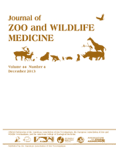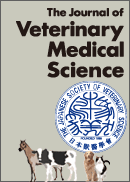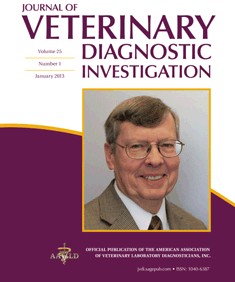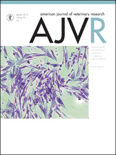
Journal of Veterinary Research
Scope & Guideline
Advancing veterinary science for a healthier tomorrow.
Introduction
Aims and Scopes
- Clinical Veterinary Medicine:
Research that explores clinical practices, treatment methodologies, and outcomes in various animal species, including companion animals and livestock. - Veterinary Pharmacology and Toxicology:
Studies focusing on the pharmacokinetics and pharmacodynamics of drugs used in veterinary medicine, as well as the assessment of toxic substances affecting animal health. - Surgical Innovations and Techniques:
Research that introduces and evaluates novel surgical techniques, tools, and technologies designed to improve surgical outcomes in veterinary practice. - Comparative Medicine and One Health:
Investigations that emphasize the interconnectedness of animal and human health, exploring zoonotic diseases and the implications of veterinary research on public health. - Animal Behavior and Welfare:
Studies aimed at understanding animal behavior, welfare concerns, and the impact of environmental factors on the well-being of various species. - Emerging Diseases and Diagnostics:
Research focused on identifying and characterizing new diseases affecting animal populations, as well as developing diagnostic tools for early detection.
Trending and Emerging
- Telemedicine and Remote Monitoring:
An increase in studies focused on veterinary telemedicine and remote monitoring technologies, reflecting the growing integration of digital health solutions in veterinary practice. - Genomics and Personalized Veterinary Medicine:
Research into genomics and its application in personalized medicine for animals is gaining traction, highlighting the importance of tailored treatment approaches based on genetic profiles. - Microbiome Studies:
There is a notable rise in research examining the role of microbiomes in animal health, disease prevention, and treatment, indicating a broader interest in holistic approaches to veterinary care. - Regenerative Medicine and Stem Cell Therapy:
Emerging studies in regenerative medicine and the use of stem cells for treating various conditions in animals are becoming more prevalent, showcasing advancements in veterinary therapeutics. - Veterinary Public Health and Zoonotic Diseases:
Research that emphasizes the One Health approach, particularly in relation to zoonotic diseases and public health implications, is increasingly prominent in recent publications.
Declining or Waning
- Traditional Epidemiological Studies:
There has been a noticeable decrease in the publication of traditional epidemiological studies focused on established diseases, possibly due to a shift towards more innovative and technology-driven research methodologies. - Basic Science Research:
The journal is seeing fewer papers dedicated solely to basic science research that does not have immediate clinical applicability, as there is a growing emphasis on translational research that bridges laboratory findings to clinical practice. - Invasive Diagnostic Techniques:
Research using invasive diagnostic methods, such as exploratory surgeries or invasive sampling techniques, appears to be declining in favor of non-invasive approaches that prioritize animal welfare.
Similar Journals

Revista Romana de Medicina Veterinara
Transforming veterinary care through groundbreaking research.Revista Romana de Medicina Veterinara is a leading peer-reviewed journal dedicated to the field of veterinary medicine, published by the General Association of Romanian Veterinarians. With its ISSN 1220-3173 and E-ISSN 2457-7618, the journal aims to advance the domain of veterinary science through dissemination of high-quality research articles, case studies, and reviews that cover a wide array of topics including animal health, veterinary diagnostics, and treatment methodologies. Although primarily focused on the Romanian veterinary landscape, its scope is designed to engage a global audience of researchers, practitioners, and students seeking to enhance their knowledge and practice in veterinary medicine. The journal is committed to open accessibility, ensuring that vital research is readily available to the academic community without financial barriers, thereby encouraging collaboration and innovation. By providing a platform for cutting-edge veterinary research, Revista Romana de Medicina Veterinara plays a crucial role in fostering advancements that can significantly impact animal health and welfare both locally and internationally.

PESQUISA VETERINARIA BRASILEIRA
Exploring the frontiers of animal health and welfare.PESQUISA VETERINARIA BRASILEIRA is a premier scholarly journal that serves as a vital platform for disseminating high-quality research in the field of veterinary sciences. Published by REVISTA PESQUISA VETERINARIA BRASILEIRA, this Open Access journal has been a beacon of knowledge since 1997, allowing global access to its valuable content and fostering collaboration among researchers, professionals, and students. With an ISSN of 0100-736X and an E-ISSN of 1678-5150, it stands out for its commitment to enhancing the understanding of veterinary practices, animal health, and public health implications in the context of Brazil and beyond. As of 2023, it holds a Q3 category in veterinary miscellaneous and ranks at the 43rd percentile according to Scopus, reflecting its growing influence and contribution to the veterinary community. Based in Seropédica, Rio de Janeiro, this journal publishes research covering a wide range of topics, aiming to facilitate knowledge exchange and drive innovation within the field. Join the conversation and contribute to the advancement of veterinary science through your submissions and readership.

JOURNAL OF ZOO AND WILDLIFE MEDICINE
Connecting professionals for the care of wild species.JOURNAL OF ZOO AND WILDLIFE MEDICINE, published by the American Association of Zoo Veterinarians, serves as a pivotal resource in the field of veterinary science, focusing specifically on the health and well-being of zoo and wildlife species. With an ISSN of 1042-7260 and an E-ISSN of 1937-2825, this journal is recognized for its significant contributions to animal science and has been categorized in the second quartile in both Animal Science and Zoology, as well as Veterinary disciplines, according to the latest rankings. It holds a respectable position within Scopus, being ranked #91 in General Veterinary and #290 in Animal Science and Zoology. While the journal operates on a subscription basis, its impactful research articles have been invaluable for clinicians, researchers, and students alike, providing crucial insights that advance wildlife conservation, veterinary practices, and animal health care from 1993 to the present. With a global reach and a targeted focus on both theoretical and practical applications, JOURNAL OF ZOO AND WILDLIFE MEDICINE is instrumental in fostering collaboration among professionals dedicated to the study and care of wild animal populations.

Frontiers in Veterinary Science
Exploring the frontiers of veterinary knowledge.Frontiers in Veterinary Science is a premier open-access journal dedicated to the latest advancements and research in the field of veterinary science. Published by FRONTIERS MEDIA SA in Switzerland, the journal has been at the forefront of disseminating high-quality research since its establishment in 2014. With an impressive rank of #15 out of 194 in the general veterinary category and a high percentile of 92nd in Scopus rankings, it is recognized as a leading publication in veterinary medicine and related disciplines, maintaining a prominent Q1 quartile status as of 2023. The journal promotes the wide dissemination of knowledge through its open-access policy, ensuring that researchers, professionals, and students have unrestricted access to critical findings and innovations in veterinary science. Nestled in the vibrant academic landscape of Lausanne, Switzerland, Frontiers in Veterinary Science is not just a journal; it is a vital resource for advancing veterinary practices and improving animal health globally.

CANADIAN JOURNAL OF VETERINARY RESEARCH-REVUE CANADIENNE DE RECHERCHE VETERINAIRE
Connecting Researchers, Elevating Animal HealthCanadian Journal of Veterinary Research - Revue Canadienne de Recherche Vétérinaire is a leading publication in the veterinary science community, published by the Canadian Veterinary Medical Association. Established in 1986, the journal serves as a crucial resource for researchers and practitioners alike, covering a broad spectrum of topics pertinent to veterinary medicine and animal health. With a current impact factor placing it in Q2 in the Veterinary (miscellaneous) category, it holds a rank of #85 out of 194 in Scopus for general veterinary research, demonstrating its influence and importance within the field. While the journal is not open access, it remains committed to the dissemination of high-quality research that fosters advancements in veterinary practice and education. Based in Ottawa, Canada, it strives to connect the international community of veterinary researchers and professionals through rigorous peer-reviewed articles that advance knowledge and methodologies in veterinary science.

BERLINER UND MUNCHENER TIERARZTLICHE WOCHENSCHRIFT
Pioneering Research for a Healthier Animal WorldBERLINER UND MUNCHENER TIERARZTLICHE WOCHENSCHRIFT is an esteemed journal in the fields of Veterinary Science and Medicine, published by SCHLUETERSCHE VERLAGSGESELLSCHAFT MBH & CO KG. Since its inception in 1946, this journal has served as a vital platform for advancing knowledge and research in veterinary medicine within Germany and beyond. With a current impact factor that places it in the Q4 category in both Medicine and Veterinary, it continues to provide significant insights for professionals, researchers, and students engaged in the veterinary community. Although it is not an Open Access journal, its rich content contributes to the foundational literature of the field, making it an essential reference. Researchers looking to publish their findings or keep informed on the latest advancements in veterinary and medical practices will find this journal an invaluable resource. It is headquartered in Hannover, Germany, and serves as a testament to the ongoing dedication to veterinary research since the mid-20th century.

JOURNAL OF VETERINARY MEDICAL SCIENCE
Bridging Research and Practice in Veterinary Medicine.JOURNAL OF VETERINARY MEDICAL SCIENCE, published by the Japan Society of Veterinary Science, serves as a critical platform for advancing the field of veterinary medicine. With an ISSN of 0916-7250 and E-ISSN of 1347-7439, this journal covers a broad spectrum of topics relevant to veterinary science, publishing original research, reviews, and case studies that contribute to the scientific knowledge base and clinical practice. Recognized for its quality, the journal has achieved a Q2 ranking in the Veterinary (miscellaneous) category for 2023, placing it within the top 35% of journals in its field as per Scopus rankings. With a convergence of years spanning from 1991 to 2024, it reflects a rich history of scholarly contributions. Researchers, professionals, and students engaged in veterinary science will find valuable insights and advancements within its pages, significantly supporting their work and enhancing veterinary practices globally. The journal is located at the University of Tokyo, and while it does not currently offer open access, it remains an essential resource in veterinary medical literature.

JOURNAL OF VETERINARY DIAGNOSTIC INVESTIGATION
Transforming animal health through rigorous diagnostic research.The JOURNAL OF VETERINARY DIAGNOSTIC INVESTIGATION, published by SAGE PUBLICATIONS INC, stands as a pivotal resource in the field of veterinary medicine, focusing on the latest advancements in diagnostic methodologies and their application in animal health. With an impressive impact factor and ranked in the Q1 category of Veterinary (miscellaneous) for 2023, this journal ensures the dissemination of high-quality research that is critical for veterinarians, researchers, and students alike. Established in 1989 and set to continue through 2024, it encompasses a broad spectrum of topics, vital for professionals committed to enhancing veterinary diagnostics. The journal's rigorous peer-review process guarantees that only the most innovative and thorough research contributions reach its audience, fostering an environment of academic excellence and knowledge transfer in the veterinary diagnostic field.

EGYPTIAN JOURNAL OF VETERINARY SCIENCE
Elevating standards in veterinary medicine and animal care.Welcome to the Egyptian Journal of Veterinary Science, a pivotal publication dedicated to advancing the field of veterinary science, particularly within the unique context of Egypt and the surrounding regions. Published by the Natl Information Documentation Centre, this journal has been a key scholarly resource since its inception in 1977, focusing on diverse aspects of veterinary medicine, including animal health, nutrition, and management practices. With an impressive editorial commitment and a wide scope covering animal science, equine studies, food animals, and small animal veterinary practice, the journal stands as a critical platform for researchers and professionals alike. While currently categorized in Q4 for Animal Science and Zoology, and achieving Q3 rankings in several other veterinary subfields, it serves as a vital avenue for disseminating innovative research and practical insights. Access to the latest findings and case studies aims to foster improved veterinary practices and enhance animal welfare standards. As we navigate the complexities of veterinary science, the Egyptian Journal of Veterinary Science remains an essential tool for those committed to the health and welfare of animals across various disciplines.

AMERICAN JOURNAL OF VETERINARY RESEARCH
Empowering Animal Health with Innovative InsightsAmerican Journal of Veterinary Research, published by the American Veterinary Medical Association, serves as a cornerstone of the veterinary medical community, providing essential insights from 1945 to the present. With an ISSN of 0002-9645 and E-ISSN of 1943-5681, this esteemed journal focuses on a diverse range of topics within the veterinary field, contributing to the advancement of veterinary science through rigorous peer-reviewed research. Ranking in the Q2 category in Veterinary (miscellaneous) and Q3 in Medicine (miscellaneous) category as of 2023, it holds a respectable position in Scopus rankings, further emphasizing its impact in the field. While currently not an Open Access journal, its objective remains clear: to disseminate cutting-edge research that informs clinical practice and enhances animal health and welfare. The American Journal of Veterinary Research is invaluable for researchers, professionals, and students seeking to stay at the forefront of veterinary advancements and innovations.